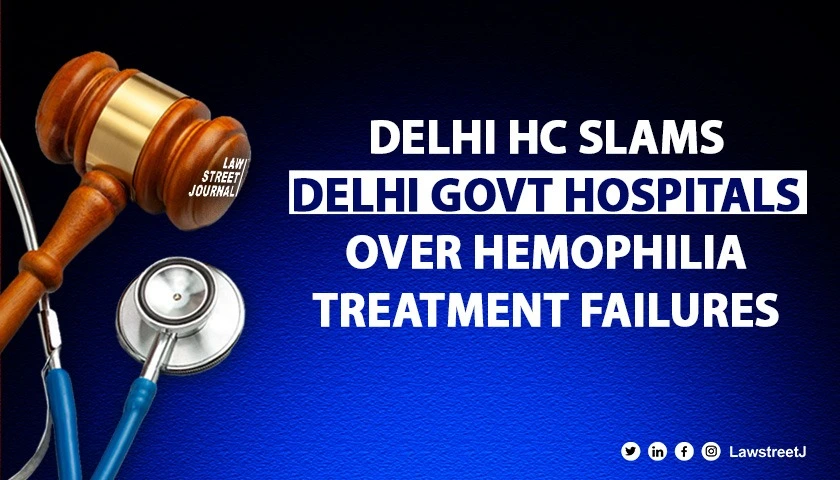New Delhi: The Delhi High Court has issued significant directives regarding the treatment of Hemophilia patients in government hospitals, following a petition highlighting severe healthcare deficiencies and medication shortages. Justice Sachin Datta made crucial observations while hearing a writ petition concerning the state of Hemophilia treatment in Delhi’s government hospitals.
The court addressed the case involving a writ petition (W.P.(C) 170/2025) filed by Sagar Sharma, a 35-year-old Hemophilia A patient, who stated in his petition that he has been receiving treatment at Lok Nayak Hospital (LNJP) for the past 15 years. The petitioner highlighted a series of critical deficiencies in the treatment facilities, including the absence of a hematologist at LNJP, Guru Teg Bahadur (GTB), and Deen Dayal Upadhyay (DDU) hospitals for the last 15 years. This has led to junior residents, who are not adequately trained in Hemophilia treatment, being tasked with treating patients, in clear violation of the World Federation of Hemophilia’s guidelines.
Additionally, the petitioner pointed out that the laboratories at LNJP are not properly staffed, with technicians signing lab reports instead of an MD Pathologist, which violates the Supreme Court’s directions. Furthermore, life-saving Factor 8 and Factor 9 injections are in severe shortage at LNJP, GTB, and DDU hospitals, leaving patients without essential medication. The petitioner also noted that these hospitals lack appropriate diagnostic laboratories, and as a result, 80% of Hemophilia cases in India remain undiagnosed due to inadequate facilities.
The petition also emphasized that these hospitals are using Plasma-Derived Factor injections, which pose serious health risks, including the potential transmission of deadly diseases such as Hepatitis and HIV. The petitioner himself contracted Hepatitis C from June to December 2024 after receiving Plasma-Derived Factor, which is not recommended by the World Health Organization in favor of safer Recombinant Factor.
The court observed, “The concerned hospital, i.e., Lok Nayak Hospital, is directed to administer the injections to the petitioner as and when required, and also ensure that a Hematologist is available and on duty to attend to the petitioner during the course of his treatment.” The court also directed that recombinant factor injections be procured and administered to the petitioner and ordered a compliance report within four weeks. The Medical Superintendent of LNJP and the Secretary of the Health and Family Welfare Department (GNCTD) have been directed to ensure necessary compliance.
The petitioner also brought to light a tragic incident reported by Hindustan Portal on August 28, 2024, where a 15-year-old Hemophilia patient, Aryan Yadav, died after being denied treatment at LNJP due to AHF unavailability.
Ms. Meera Kaura Patel, Mr. Puru Pratap Singh, Ms. Ritika Saini, Ms. Manika Pandey, and Mr. Vikash Vadh appeared for the petitioner, while Mr. Sameer Vashisht (Standing Counsel) represented GNCTD.
Case Title: Sagar Sharma vs. Health and Family Welfare Department & Ors.



![Delhi High Court Sets Aside Arbitral Tribunal's Award Against NHAI in Highway Project Delay Case [Read Judgment]](/secure/uploads/2023/07/lj_9605_23374c2e-392c-4491-a2fe-f2f12fc5272f.jpg)
![Delhi Court Rejects Stay Request in Defamation Case Against Rajasthan CM Ashok Gehlot [Read Order]](/secure/uploads/2023/08/lj_5208_80de1ddc-d76a-4f7f-b180-408e3ae14fb4.jpg)





